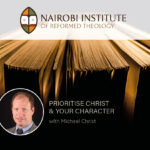Excellent Reformed and Evangelical conferences are held across Africa every year. The TGC Africa Podcast showcases select conferences to encourage and build up the local church across our continent.
This sermon was delivered at the 2023 Rooted Conference, which is hosted by GracePoint Church Kikuyu in Kenya. The conference’s theme and title was Rooted in the Cross of Christ. Each talk surveys an aspect of Christ’s death on the cross and the implications for believers today.
In what is one of the most stunning twists of the Old Testament narrative, God orders Abraham to take his only son, Isaac, and give him up as a burnt offering (Genesis 22:2). It’s stunning for many reasons. For starters, Abraham had waited on God’s promise of a son for decades. Was he now to kill him? Then there’s the fact that God strictly forbade human sacrifices. So why does God command Abraham to take Isaac with him, up Mount Moriah? It doesn’t make sense. It almost certainly didn’t make sense to Abraham. Yet in it we learn much about the cross of Christ and the love of God the Father.
The Father Gives His Only Son at the Cross
Elsewhere in the Bible we read that this was a test. That God was testing his servant Abraham, his love and obedience. His commitment to God over above everything else in his life, even his dearly beloved son Isaac. Likewise, living a life of obedience and faith today will make demands and issue choices that don’t make sense.
God our Father has willingly and lovingly given us his only Son.
As Fidel Nyikuri puts it in this elective talk, “Brothers and sisters, the life of the cross is a life of us showing that we love God more than we love that which he has given us. It is a life calling us to sacrifice that we think is so precious to us, for the sake of the one who gave his precious life for us. And so here is Abraham, in the midst of the test.” Only God steps in, providing a ram that dies as a substitutional sacrifice for Isaac. In the same way, God spares us and gives up his only Son to die the death we deserved so that we may be reconciled to God.
In Fidel’s words, “Just as Abraham did not withhold his only son the one he loves but willingly gave him up, so has God our Father willingly and lovingly given us his only Son for us. God also has given us his Son. God did not spare his Son.”
Other Content On This Topic
Child Sacrifice in Uganda: The Chilling Truth & Gospel Cure
Fasten Your Hope to the Unfailing Love of God
The Slaughtered Lamb Is Africa’s Ransom
Are We Free to Worship God However We Choose?
Date: Saturday, 8th April 2023
Location: 2023 Rooted Conference, GracePoint Church Kikuyu, Kenya
Transcript
God’s Plan
Praise God. My name is Isla. Today’s reading will be from Genesis chapter number 22 from verses 1 to 14. Genesis chapter number 22:1-14. For those with the ESV Bible version, this is Page 15. We can read.
After these things God tested Abraham and said to him, “Abraham!” And he said, “Here I am.” He said, “Take your son, your only son Isaac, whom you love, and go to the land of Moriah, and offer him there as a burnt offering on one of the mountains of which I shall tell you.” So Abraham rose early in the morning, saddled his donkey, and took two of his young men with him, and his son Isaac. And he cut the wood for the burnt offering and arose and went to the place of which God had told him. On the third day Abraham lifted up his eyes and saw the place from afar. Then Abraham said to his young men, “Stay here with the donkey; I and the boy will go over there and worship and come again to you.” And Abraham took the wood of the burnt offering and laid it on Isaac, his son. And he took in his hand the fire and the knife. So they went both of them together. And Isaac said to his father Abraham, “My father!” And he said, “Here I am, my son.” He said, “Behold, the fire and the wood, but where is the lamb for a burnt offering?” Abraham said, “God will provide for himself the lamb for a burnt offering, my son.” So they went both of them together.
When they came to the place of which God had told him, Abraham built the altar there and laid the wood in order and bound Isaac his son and laid him on the altar, on top of the wood. Then Abraham reached out his hand and took the knife to slaughter his son. But the angel of the Lord called to him from heaven and said, “Abraham, Abraham!” And he said, “Here I am.” He said, “Do not lay your hand on the boy or do anything to him, for now I know that you fear God, seeing you have not withheld your son, your only son, from me.” And Abraham lifted up his eyes and looked, and behold, behind him was a ram, caught in a thicket by his horns. And Abraham went and took the ram and offered it up as a burnt offering instead of his son. So Abraham called the name of that place, “The Lord will provide”; as it is said to this day, “On the mount of the Lord it shall be provided.” (Genesis 22:1-14)
And this is the word of the Lord.
Good morning and praise the Lord! It’s wonderful to be here this morning and we have already been blessed by the preaching of our brother, our Pastor Dan. In fact, as I was sitting there, I thought, You God would send your only Son, the Son you love, to come and die for wretched sinners such as we. Help us to see the realities of the cross, that this was not an afterthought, but this is what you planned from time eternity. So help me Lord, as we think about this. In Jesus’ name I pray.
The demonstration of the cross. What we’re going to do in this session this morning is to look at a passage in the Old Testament and to see that the cross was God’s plan from time in eternity. It was not an afterthought. God planned it and he sent his Son to execute it.
You know, sometimes when we think about the cross of Jesus Christ, we look in the New Testament and we think, well, things went wrong. God had to look for something else, perhaps even outside of his will, so that he can do something to save, to rescue fallen humanity. Right here, in this passage, Genesis chapter 22, we see that the cross is God’s plan to rescue, to save fallen humanity.
Great Sacrifice
Now let me start by quoting these words of the late professor, George Saitoti. Having served for many years as a vice president, at a time when he was perhaps at the peak of his career and everyone was thinking he was going to become the president, there was a merger that happened between two parties. And it meant then, you know, the chances of him becoming a president were slim.
And you remember that day the word that Professor, the late professor George Saitoti said, “There comes a time when the interest of the nation is greater than an individual.” He did not want to fight, he didn’t want to go around and saying, “I am the one who has the right to be the president.” You can say, in other words, he sacrificed the chances of him being a president at that time for the good of the nation.
Friends, if you’ve been in this world for however long you’ve lived, you know that at some point you’ll be called to make sacrifices. If you’re thinking of achieving something great in your life, I’m sure even to come where you are at this point in life, you have had to make sacrifices. And I don’t want to go on, if you have gone through the Kenyan education system, what it means for you to sacrifice, for you to get good grades.
And this world we’re living in, we see that sacrifices define our lives if we are going to make a great and leave a great, great impact in this life. That’s how it is. And you know what, sometimes the sacrifices we have to make will not just be for our good, but for the good of others. And that becomes even more painful.
A few years ago after the great earthquake that happened in Japan, there is a story that was told of a certain child that was rescued. After the earthquake had subsided, when the rescuers reached the ruins of a young woman’s house, they saw her dead body through the cracks but her pose was like that of someone who was worshiping, someone who was praying. She was kneeling down. And so the guy leading the team came and, you know, put his hand through the rubble and he saw this body was cold, the woman was dead. And so he left with a team because they were thinking there are so many, you know, living people, there are so many people who are still alive we need to rescue. And so, they went on.
But as they were going something stirred this man and he told his team, “Let’s go back to that house.” And so, they went back and again, reaching his hand through the debris, through the cracks, he saw something underneath this woman. There was a baby, a three month-old baby under this woman, wrapped in a shawl. And this man, after he saw that, he screamed with excitement, “A child! There is a child!”
And to the astonishment of their rescue team, this child was still alive. He was a baby boy, 3 months old. He had not died. You see, when this house was falling down, this woman took the baby under her and she used her body as a shield. She sacrificed her life so that this boy can live.
And not only that, in the blanket that was wrapping this baby was this message written on a phone that she wrote before she died. And this is what the message said: “If you can survive, you must remember that I love you.” And so this phone passed around to everyone and they were looking at that message with tears shedding, rolling down their cheeks, just encountering this immense sacrifice that this woman made for her son to live.
Friends, the story before us, Genesis chapter 22, gives us a picture of a sacrifice, not made by Isaac, not made by Abraham, but pointing us to a greater sacrifice made by the Son of God, the Lamb, so that you and I can live.
And here’s the thing: if you’ll forget anything I want to say, that the Lamb of God dies. God provides his Lamb who dies. And the message is: if you are rescued, remember that I love you. Because the Lamb of God gave his life, he died so that we can live.
Let’s get through this story. What I want to, what I want us to do is, we’ll have a reading through this story, just to see, to get the feeling in its context what this is all about, and then we’ll apply the same story in light of the cross – what that means for us, these people who are living after Jesus paid the price for our sin. And here’s the thing: we’ll look at this with these two headings: God tests and God provides.
God Tests
Verse 1 to 8, God tests. We are told in verse 1, “After these things…” (Genesis 22:1) After what things? You know, if you can just step back and look at the life of Abraham, he is a man who was doing well, who had been promised many things by God. And he had seen in his life God fulfilling promise after promise after promise. Things were not easy: first; from being told, “Leave your land, your own people go to a place which I’ll show you,” With God promising him great things, Abraham obeyed. He moved by faith and he journeyed.
And later on, we see in some way these promises being fulfilled. The land was there. He saw blessing. He had so much wealth, so much livestock. But there was one thing remaining: he still did not have a son, he still did not have a son.
And he asked God, remember in Genesis 15, “God, you still haven’t given me a son. And all these blessings you’re talking about, all these things you’ve promised, they are going to be inherited by Eliezer, my own servant.” (Genesis 15:2-3)
But God told him, “No, no, no, no, I’m still sure to fulfil my promise.”
Abraham had a good wife by the name Sarah. Sarah was like, “God seems to be taking long. Let me give you my house help. Sleep with her and let’s get a son. Let’s help God to fulfil what he has promised.” Ishmael was born but remember again God saying, “This is not in my plan. This is not what I intended.” And in the end, God fulfilled his promise by giving Abraham a son.
In fact, it’s very interesting, in chapter 18 of Genesis, when God was speaking to Abraham about this promise of a son, you remember where Sarah was? What did Sarah do? She laughed! She laughed because she was like, “How can a dead woman like me – someone whose womb is dead – give birth to a son?” She laughed. But then, a year later, God fulfilled that. And you know what Sarah and Abraham did? They continued laughing, this time out of sheer joy in seeing what God had promised being fulfilled. They even named their son “laughter,” Isaac.
And so, all this has happened and when Isaac was born, it meant then Ishmael would have to go. So in chapter 21, Ishmael leaves and there’s no doubt that the son will inherit, the son who will be the heir of all these promises, through whom God will bless the nations, is none other than Isaac.
This is where Abraham is. You can imagine him having come from a pagan, a pagan background, perhaps visiting his uncles and cousins, that he’ll be saying, “You guys see how old I am? At 100 years, my God gave me a son! Can your God even…” You know?
He’s seen the goodness of the promises, the goodness of God in God granting him this. A guy called Abimelech, they have made a treaty and everything seems to be settled. Abraham is – let me use that phrase only for once – “living his best life now.”
And then we read here in verse 1, God calling to Abraham saying, “After these things God tested Abraham and said to him, “Abraham!” And he said, “Here I am.” (Genesis 22:1)
At the moment when things are working good for him, God tests. It’s a test, but you know, Abraham doesn’t. All that he says in verse 2, “Take your son,” You know, he says to him, “Take your son and go to one of the mountains in the land of Moriah and offer him there as a burnt offering.” Does God say that? He doesn’t say that! You know, what if he had just told Abraham, “Take your son and go offer him,” Abraham would have sent his servant, “Go quickly, let’s get Ishmael. That’s the one I want to offer.”
But God is very specific. “Take your son, your only son Isaac, whom you love…” (Genesis 22:2)
You see, this son who is standing as the heir, as the fulfilment of the promises of God, God is bringing a threat and telling Abraham it’s like all you’ve been working for is now kaput. It’s like a balloon blown and then God is coming with a pin and he’s saying, “I want to burst this bubble.”
This is agonizing for Abraham. That night might have been a very long night for him, with Sarah perhaps wondering, “Why is this man is standing the other side of the bed? He doesn’t even want to look to come closer to me. Is my breath that bad, that my husband is turning away from me?” Agonizing over that night with what God is telling him, “Go and offer your son.”
You see, friend, it seems like God is abandoning his moral and ethical laws he had made. It’s all becoming useless now because he’s taking the very thing that is going to fulfil all that he had said.
But God tells him, “Take him.” And the question now here is what will Abraham do? What will he do? Then we are told in verse 3, the next morning, he arose the next morning…
But look at the events there: he arises in the next morning, he saddles the donkey, he takes two of his young men, the servants there and then he also takes Isaac and then he splits the wood.
You’re like, what is this guy doing? Why would he want even to split the wood? Why would he even want to be the one doing that work himself? Can’t he find wood wherever he is going? Can’t he let his servant split the wood? I think it’s just part of the agony he’s going through and some would say that with every strike, every stroke of the ax on the wood, in his mind Abraham was thinking of the strike of the knife that would have to cut through Isaac.
And so there he is in the morning, agonizing, but he obeys. He starts on this journey with the young man and with Isaac, the son. And off they go. And we’re told then on the third day, as they coming near this place, Abraham lifts his eyes and he sees the place from afar. And then, verse 5, look what he tells these men. He tells his two young men, “Stay here with the donkey; I and the boy will go over there and worship and come again to you.” (Genesis 22:5) We will come again to you.
And you’re wondering, what is this guy saying? What does he mean? Is he becoming like a Kenyan, who says “I’ll come!” like and you know he’s gone!” What is he doing?
In some ways, you know, he can’t tell them, you know, “You guys stay here. God has commanded him I’m going to sacrifice Isaac. So you stay. I will come again myself.” I mean, you can’t do that. He can’t say that in the hearing of Isaac,
Of course, we, being readers of the New Testament, we know how Hebrews says Abraham believed. This was his faith and he believed that God would raise his son. He raised Isaac from the dead, Hebrews 11:17 to 19. And for some, in some way, God did raise Isaac from the dead. But when Abraham is saying this, I don’t think he has that in mind. He is not perhaps thinking that. For him, the call is, will he obey what God has commanded him to do? Does he love God so much that he’s willing to sacrifice his most prized asset? Does he?
You see, brothers and sisters, the life of the cross, and we shall say this more, is a life of us showing that we love God more than we love that which he has given us. It is a life calling us to sacrifice that we think is so precious to us, for the sake of the one who gave his precious life for us. And so here is Abraham, in the midst of the test, there he is, he sees the place from afar and something happens. In verse 6, he takes now this wood from the donkey and He places it on Isaac.
It’s so interesting here you know Isaac is carrying the wood he doesn’t know that he is the one is going to be offered as a sacrifice. He is like a lamb leading himself to slaughter, carrying the very wood on which he’s going to be laid.
And so he takes it and the two of them walk going up the hill. Isaac, seeing what is happening, he breaks the silence. It’s so awkward. He’s like, “Dad, my father,” verse 7. He’s like, “Here I am.” And Isaac asks him, He said, “Behold, the fire and the wood, but where is the lamb for a burnt offering?” (Genesis 22:7)
“Yeah, I’m carrying the wood, you’re carrying the fire. You have the knife but where is the lamb?” Where is the lamb? Where is the lamb? You can imagine the sweat from Abraham’s brow at this very question! Where is the lamb for the burnt offering?
Just before we get any further, here’s a thing: it shows something how, somehow how Isaac has been raised as a worshipper of God. He knows for there to be to worship their needs to be a lamb to die so that people can have their sins forgiven, they can be granted after access to worship God the Father. And so, he’s wondering, “We are going through all this to make this offering, to worship, but where is the lamb? Where is the lamb?”
And see the way Abraham answers again. He tells his son in verse 8, “God will provide for himself the lamb for a burnt offering, my son.” (Genesis 22:8)
And so, off they go. And again, it seems so interesting here. Is he sure that God is going to provide? Is he trying just to pass time? Is he lying to his son? Other commentators have said actually instead of there being that comma there, “God will provide for himself a lamb for a burnt offering – comma – my son,” it’s actually “God will provide for himself a lamb for burnt offering my son.” It’s like Abraham’s saying, “Actually my son, you are the lamb for the burnt offering.”
And so, off they go. Isaac carrying the wood; Abraham is carrying the knife and the fire. And they go to the place where God had told them to go. Abraham is ready to offer this sacrifice. I mean, it doesn’t come easy, brothers and sisters. Sometimes we look at this story and we think it was easy for Abraham. It’s not easy. This is already a great sacrifice for him. He’s willing to lay it on the altar for the sake of worshiping God. That is the test. Will Abraham be able to pass this test?
God Provides
Well the second point to see is that God provides, from verse 9 to 4. And so, they reached the place they had been traveling to and then Abraham builds an altar. And again, just think about this: he’s there building this altar, he’s with the son taking the stones around, perhaps asking Isaac, “Please pass me that stone. Okay, let’s build.” And then they build. And Isaac is there doing that with swear dropping from their faces. Doing that together, the son helping the father. And then it comes to the wood. “Pass me that, not that big one, the small one first, okay yeah, the big one.” They lay them clearly and they start laying on the altar, wood after wood, small twigs and all that. And then, Isaac is wondering, “Where is the lamb?”
Then Abraham calls, “Isaac, come here my son.” To the surprise of Isaac, he is bound by his own father with strings, with cords, with ropes and then he’s laid there on the altar. He discovers, “I’ve walked myself right into trouble and I didn’t know it!”
There he is. And lest we think again here is just, you know, Isaac being naive or something, think of it this way: at this point Abraham is about, you know, 115, 117 perhaps, and Isaac is like 15, 17 years old. Now tell me; between an over 100 year old and a 17 year old – who is stronger? 100 year old is stronger than a 17 year old? He could have done anything. He could have pushed the dad away. He would have said, “No you cannot tie me!” You are a liar! You said – you promised. You said there will be a lamb that God will provide, but why are you tying me?”
You know, today one thing that is common with our children is they say, “Why are you lying, dad? Why are you lying, mom?” They keep telling that. They want to hold us at our very word. Well, sometimes I have to remind them, “I’m the dad here!” You know, but so Issac will be, “Was my dad lying here?”
But there’s something about Isaac that we need to see here. Isaac is not just a passive person. He is not just a passive, complacent, whatever is happening – he’s submitting. He’s trusting the father. He’s willing and ready to go under the knife.
Think about that: he’s willing. He submits to the father. He’s ready to go under the knife as long long as they can worship God the father. And in the moment, with this the hand of Abraham raised up, a voice comes from Heaven. The angel of the Lord calls from heaven, in verse 11: “Abraham, Abraham!” And he said, “Here I am.” And the angel tells him, “Do not lay your hand on the boy or do anything to him, for now I know that you fear God, seeing you have not withheld your son, your only son, from me.”(Genesis 22:11-12)
Here, brothers and sisters, Abraham passes the test. I think there’s this moment he realizes, “Oh! This is what you were doing! This was a test!”
The angel telling him, “Do not lay your hand on the boy. I can see you actually fear God; you are indeed a true worshiper. You did not spare your son, you did not love the gift more than the giver. You’re willing to go the mile to sacrifice your son. I can see you are a true worshipper of God.”
And then, as if that is not enough, after this commendation has come to Abraham, verse 13 he lifts his eyes again, as he lifted and saw the hills, he lifts his eyes and behold, behind him, the ram. There’s a ram caught in a thicket by its horns. And you know what Abraham does? He leaves Isaac, he runs and he takes this ram and he offers it as a burnt offering instead of his son Isaac.
There what Abraham said has become true: God provided. God provided out of nowhere. He didn’t know how but for this worship to happen, God provided a ram himself so that not only Isaac walks, but also Abraham walks, after having bowed down to worship this God.
And then we end with the famous verse 14, “So Abraham called the name of that place, “The Lord will provide”; as it is said to this day, “On the mount of the Lord it shall be provided.”” (Genesis 22:14)
This very act that God did became prophetic and here something: Abraham is able to worship because God provides. God provides a lamb who dies; it’s a ram who dies in place so that Abraham and Isaac can worship God.
And it becomes prophetic for God’s people, that whoever will worship God; it has to be by God himself, by the means that God has provided. If we are to worship God, then God has to see to it, he has to provide. That is what he’s saying here, that God provides. And God’s people remembered this. From this day they even sang a song saying that on the Mount of the Lord God it shall be seen, it shall be provided.
Tested Love and Worship
Now brothers and sisters, as you run through this story, I’m sure there are many things we can talk about, and many things we can talk about the faith of Abraham and it’s a reality there. But I want us just to zoom in and talk about two things.
The question here is that God was laying before Abraham was, ”Do you really worship me? Do you really love me?” Remember at the end of John’s gospel? The question that Jesus was asking Peter? “Do you really love me more than these? Do you really love me more than these?” (John 21:15-17)
It’s the same question here: do you really love me? “Do you, Abraham, love me more than you love your son? Is your allegiance to me greater than to your son?” Was he ready to give his most precious thing, his most prized asset? Did he love more, did he love God more than the gift?
Friends, for us who are living in the light of the cross, let it not be lost to us, really our faith will be proven, if we love God more than we love anything, if we love God more than what he has given us, what we have, what we are, what we want to achieve in this life. That is the pattern of the Christian life.
And Peter will talk about this, as he writes in one of his letters, he said test come to us so that the tested genuineness of your faith may be found to result in praise and glory and honour. (1 Peter 1:6-7) You see, this test came to Abraham and to show that he loved God. He was indeed a true father of faith.
Ed Clowney commenting on this says that the demand that the Lord made of Abraham is not unthinkable. He makes that same total demand of you today. Lest you think this is something unthinkable, God still makes unthinkable demands on us. Jesus asks it of everyone who would follow him. He says in one of the gospels, one of the gospels, whoever loves the father, mother, son or daughter more than the Lord is not worthy of him. (Matthew 10:37-39) Indeed, only as we are ready to receive our own death sentence and take up our cross, do we receive everlasting life.
Friends, Abraham is showing us the way of the cross, being able to sacrifice, to give that which is most prized of us, so that we can worship God.
And this is something that has gone on even in the rest of church history. You read the story of a man like Polycarp. At a time when there was intense persecution, and Polycarp being brought before the proconsul and the proconsul told him, “Respect your age! Swear by the divine power of Caesar. Change your mind.” The proconsul urged Polycarp, “Take the oath and I’ll let you go. Curse Christ.”
But then listen to the words of Polycarp telling the proconsul, “86 years I have served him and he never did me any wrong. How can I blaspheme my king who saved me?”
Brothers, because Jesus died on the cross, he demands of us to sacrifice everything for him. There’s nothing that you can say, “this belongs to me.” He gave everything. We who are living in light of the cross who should be wary of having a cheap Christianity that does not demand anything from us. Brothers and sisters, we need to be wary of a Christianity that is just triumph and triumph and enjoyment and we think life is just easy.
Christ calls us to make sacrifices for him. Men and women throughout history have made sacrifices for the sake of the gospel because they loved Jesus more than they loved even their own life. You can go to Hebrews chapter 11 and read that hall of fame. See the sacrifices that God’s people made for the sake of their faith in the Lord Jesus Christ.
Let me ask you this morning, what are you willing to give up? What are you willing to sacrifice? Or if whatever you have was taken away, would you still worship God? Or do you still cling to it because you think that is the most prized asset that you have, more than even your worship of God, more than your faith in God?
God’s grace that has given us all, demands of us all. That’s number one: genuine faith – tested faith is genuine faith.
Trust the Lamb Provided By God
But number two what we learn in light of the Cross is that: trust God’s only Son, the lamb provided by God as our substitute. We need to trust God’s only Son, the lamb provided by God as our substitute.
You see, God asked Abraham to offer Isaac as a burnt offering, but in the end Abraham did not have to sacrifice Isaac. Do you know why? Do you know why? Because he prayed? Right? Because he had something up his sleeve? Because he tricked God? No, because God provided. God provided a ram caught in a thicket that was a perfect substitute for Isaac. God himself saw to it. God himself provided a ram.
And you know what, friends, brothers and sisters, actually when you read the rest of the Bible from this on, is the search for the answer to the question: “Where is the Lamb for the sacrifice?” And you are now also seeing the answer that Abraham gave; “The Lord himself will provide the lamb for the burnt offering.” That’s what Scripture brings to us.
And when you read and you come to the New Testament, you see clearly this being revealed, that God himself gave his Son to be a lamb, sacrificed for you and I. How do we see this in this story? Let me mention five ways we see this in this story; how God himself provided this lamb.
Number one, just as Abraham did not withhold his only son the one he loves but willingly gave him up, so has God our Father willingly and lovingly given us his only Son for us. This Abraham, he did not withhold. God also has given us his Son. God did not spare his Son.
Paul tells us Romans 8:32, “He who did not spare his only Son, how much more will he not give us all things along with him?”
Jesus has been given; he has come as the only Son of God given to us. Not only is Jesus the only Son of God, but he is the Son who God loves.
By the way, some want to say that in this story of Genesis chapter 22 is the first place we see the word “love” being used. And what is this love here? Love for a man, for a woman? It’s love of a father for his son. And you know what, when you read in the gospel we see at the time when Jesus was being baptized, when the voice came from heaven, what did he say? “This is my son, my only son, whom I love.” (Matthew 3:17) God gave his best. God gave his Son, whom he loves, for us.
John writes in his first letter, in chapter 4:10, “In this is love, not that we have loved God but that he loved us and sent his Son to be the propitiation for our sins.” (1 John 4:10) You see how love works here? God loves and he gave that which he loves, to show that he loves us.
Number two, in Genesis 22:6, the wood that was laid on Isaac and he carried it up on a hill, this very wood was laid there on the altar, and Isaac was bound and put on that wood to be sacrificed there. And the story, when you read in the Gospel of John chapter 19 in verse 17, Jesus as he was walking up the hill, he carried wood on his shoulder. And you know what, this is the same wood that Jesus was laid. Not being laid in this position horizontally this way, not being laid across, but being raised vertically, being lifted. The Son of God carried his cross. He was laid on the cross and he was lifted high for all to see so that we can be saved.
And do you know what, the Son of God did not come down from that wood. He did not walk away. He died giving his life, shedding his blood, giving up his body for us, so that our sins can be forgiven.
And we talk about the question – number three – we’re talking about the question that Isaac asked his father, “Where is the lamb?” The rest of the Bible is showing us there is a lamb, there is a lamb given by God. This lamb dies in our place so that we can be forgiven.
In John chapter 1, John the Baptist with his first disciples, he saw Jesus walking and you know what he said? He tells these guys, “Guys, behold the Lamb of God that takes away the sins of the world.” He did not say that once, he said twice in verse 29 and verse 36, “Behold, the Lamb of God that takes away the sins of the world.” (John 1:26; 36)
The answer to the question, “Where is the lamb? Where is the lamb?” is answered in the Gospels. This lamb is the Son of God and we are all called to behold this Lamb of God, the Son of God who takes away the sin of the world. The perfect lamb without wrinkle, without spot, without blemish. He gave his life for us. God provided himself.
I like what one commentator has said on this, as he was thinking about this question that Isaac asks and Abraham answered. You see when he says, Yahweh Jireh the Lord will provide, this takes us close to the heart of the paradox of Calvary. God requires the lamb. You know, God requires the lamb. But you know what, God provides the lamb. Not only that, but God offers the lamb.
But he provides this lamb, not from outside of himself, God provides the lamb from within himself, from within offended deity. The Father sends his Son, the Lamb, who comes and dies for us, so that we can live.
And the fourth thing we see there – the statement, “On the mount of the Lord it shall be seen” or “On the mount of the Lord it shall be provided,” is prophetic. And they say God’s people pick this and they run with it, because when you continue reading in the Old Testament, at a time during the time of David in 1 Chronicles chapter 21, when he was counting the army and the Lord brought this plague among the people, do you know David did? He went and there was this threshing floor of a man called Ornan. When the angel reached that place on that threshing floor of this man called Ornan, the angel stopped from continuing with the plague that was happening in the camp of the Lord’s people.
And we read later that actually it is this place, the threshing floor of Ornan, that is the same place of Moriah, where Abraham was with Isaac. And in fact, later on, in 2 Chronicles chapter 3 it is the same place that Solomon built the temple, on this place, this place Moriah. This is prophetic. It’s speaking to things that will come.
Later on when Solomon comes and builds the temple right there. And you know what the temple is; the temple is there to show that God’s presence is with the people. The people now have access to God. They can worship God. It is the place of sacrifice where animals are slaughtered, they are killed, so that the sins of the people can be forgiven.
It is the place, you remember, actually in two kings – one Kings? Your kings! One Kings! One Kings, after the dedication of the temple, do you know what happened, as Solomon was there lifting their hands and praying? The glory of the Lord came and filled the temple.
Friends, on the mount of the Lord it shall be provided. And God indeed provided a way, even for the Old Testament people to have access to God, to worship God.
And you know what, and sometimes we take this Jehovah Jireh, the Lord will provide and we think, “Oh yeah, I don’t have school fees – God will provide. I don’t have a husband – God will provide. I don’t have a wife – God will provide.” And we’re saying, “The Lord will provide,” but friends, let’s not lose the deeper meaning of this: on the mount of the Lord it shall be provided because God is going to provide a lamb who will die in our place so that our sins can be forgiven, so that we can have access to worship God without any fear of receiving the wrath of God upon ourselves.
And right there, in the New Testament, many years later, we see God providing his own Son. And this Son took the cross, he walked up this hill in the same way Isaac and Abraham walked, and he went to that place Golgotha – which I’m told is the place Moriah – and there he died. God saw to it on the mount of the Lord. God saw to it. God saw to it that there is a place, there’s a way opened, so that we, as people of God, can worship Him.
And number five, Isaac submitted. He submitted to the father, he trusted. And in the same way, the Son of God submitted to the will of the Father. We have already seen that in Luke. He said, “Not my will be done, but your will be done.” (Luke 22:42)
The Son of God had to learn obedience by what he suffered. He had to become like us in every way and he was perfected through suffering. And Hebrews tells us in chapter 5:8 and 9, he learned obedience through what he suffered and being made perfect, he became the source of eternal salvation. (Hebrews 5:8-9)
Jesus submitted to the will of the Father. He obeyed the father. He learned that through suffering so that he can become the source of eternal salvation, so that you and I can be saved and spend eternity with him.
The Way to Worship
Friends, do you see what a great gift God the Father has given to us, that he would give a lamb, his own Son, to die on the cross for us so that we can be forgiven, so that we can be granted access to worship the Father.
And here’s the thing: if there’s a way we are to worship, we have to worship God only. Do you know what the death of the Son does? It is that he takes on the wrath of God upon himself.
You see, like the ram was being consumed there right there on the altar in Moriah, in the same way the Son was there on the cross and he was consumed by the fires of the wrath of God, so that you and I can live, so that you and I can worship our God.
The story is given of one place, I think it’s of Mexico or wherever, when there was this fire, forest fire that came and consumed like a vast, huge tract of land. And as the people were there trying to put out the fire, they noticed a chicken. It was dead. Don’t worry why these people are laughing. They say whenever I’m preaching, I have to mention food, but I haven’t mentioned any food. I just said there was a chicken!
This chicken was dead. And so, as they went and removed that chicken, they discovered under this chicken were chicks. It had brooded over chicks and these chicks were still alive. The forest fire had come and consumed the chicken, but there underneath, the chicks were still alive.
Friends, it’s the same thing that Jesus has done for us. On that cross, he took the fires of the wrath of God so that you and I, who come under his wings, can live. You and I don’t have to incur the wrath of God upon us. We can live to worship him, to glorify him. May this story of Easter, then, help us to see just what the Lamb of God has taken for us, to give us life.
And back to the story that we started: when people saw that text that the woman had written, “If you can survive, you must remember that I love you” – that’s what Jesus tells you.
Lord, we thank you so much for giving your Son, the Lamb of God, who gave his life for us. Help us, even during this period of Easter and more than this period in the life, in the days to come, this will be our life – living in light of the cross, knowing how much, oh God, you have given for us.
Fidel Nyikuri currently serves as an Associate Pastor at GracePoint Church, Kikuyu on the outskirts of Nairobi, Kenya. He is also a Biblical Studies student at Africa International University (NEGST).
After his undergraduate, Fidel did an apprenticeship with iServe Africa where his passion for bible exposition and mentoring grew. He is passionate about helping others learn and grasp the truths of God’s word, training and equipping them so they can understand and teach the Bible well.
Fidel is a contributor on Watumishi wa Neno (Servants of the Word) blog. In his spare time, Fidel likes watching sport and playing football. Fidel is married to Christine and they have two children.














